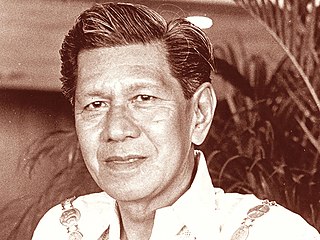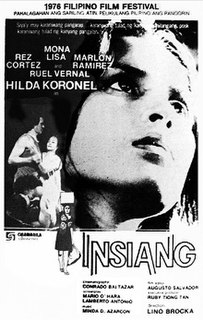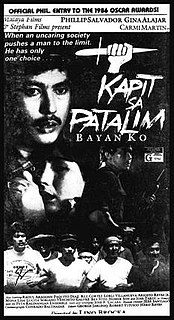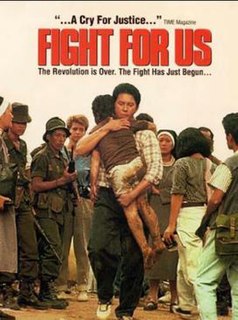
Catalino Ortiz Brocka was a Filipino film director. He is widely regarded as one of the most influential and significant filmmakers in the history of Philippine cinema. He co-founded the organization Concerned Artists of the Philippines (CAP), dedicated to helping artists address issues confronting the country, and the Free the Artist Movement. He was a member of the Coalition for the Restoration of Democracy.

Nicomedes "Nick" Marquez Joaquin was a Filipino writer and journalist best known for his short stories and novels in the English language. He also wrote using the pen name Quijano de Manila. Joaquin was conferred the rank and title of National Artist of the Philippines for Literature. He has been considered one of the most important Filipino writers, along with José Rizal and Claro M. Recto. Unlike Rizal and Recto, whose works were written in Spanish, Joaquin's major works were written in English despite being a native Spanish speaker.

Manila in the Claws of Light is a 1975 Filipino drama film directed by Lino Brocka based on the novel In the Claws of Brightness by Edgardo M. Reyes. It is considered by many as one of the greatest films in Filipino cinema. It tells the story of Júlio Madiaga, a young man from the province of Marinduque who arrives in Manila for a mission to find his lover Ligaya. While making plans for his mission, he has to survive the conditions in the capital city, contending with issues like crime and prostitution.
The Cinemanila International Film Festival is an annual film festival held in Manila, Philippines. It was founded by Filipino filmmaker Amable "Tikoy" Aguiluz in 1999. The focus of the festival is on the cinema of the Philippines as well as Southeast Asian cinema.
Esmeralda Diaz Tuazon, known professionally as Amy Austria-Ventura, is a Filipino actress.
Mario Herrero O'Hara was a Filipino film director, film producer and screenwriter known for his sense of realism often with dark but realistic social messages.

Kisapmata is a 1981 Filipino psychological horror film directed by Mike de Leon, written for the screen by De Leon, Clodualdo del Mundo Jr., and Raquel Villavicencio. The plot was inspired by Quijano de Manila's January 1961 article "The House on Zapote Street", which first appeared on an issue of the Philippines Free Press magazine and was later republished in de Manila's non-fiction crime anthology, Reportage on Crime (1977). It starred Vic Silayan, Charo Santos, Jay Ilagan, and Charito Solis.

Alice Bueñaflor Lake, better known by her stage name Anita Linda, was a Filipina film actress. A romantic lead in her youth, she later gained critical acclaim for her portrayals in maternal or elderly roles. At the age of 74, she became the oldest actress to ever win a FAMAS Award, when she was named Best Supporting Actress for Ang Babae sa Bubungang Lata.

Insiang is a 1976 Philippine drama film directed by Lino Brocka. Its screenplay, written by Mario O'Hara and Lamberto E. Antonio, is based on O'Hara's teleplay of the same name. Set in the slums of Tondo, Manila, the film stars Hilda Koronel as the eponymous character: the young daughter of a resentful mother, whose much-younger lover rapes her. After her assault and the betrayal of her own lover, Insiang seeks revenge. A representation of urban poverty, the film explores themes of betrayal, revenge and despair.
The 9th Metro Manila Film Festival was held in 1983. Only eight movies participated.
Phillip Mikael "Ipe" Reyes Salvador is a three-time FAMAS award-winning Filipino film and television actor.

Manila is an independently produced twinbill film that pays homage to Lino Brocka's Jaguar and Ishmael Bernal's Manila By Night. Piolo Pascual co-produced and starred in both episodes.

This Is My Country is a 1984 Filipino drama film that is directed by Lino Brocka. The film was a part of the main competition at the 1984 Cannes Film Festival. It was selected as the Philippine entry for the Best Foreign Language Film at the 58th Academy Awards, but was not nominated.
Michael Benedict P. Rodriguez was a Filipino actor and model. He got his start in show business when he was discovered by the filmmaker, a National Artist for Film, Lino Brocka, who cast him in a Close Up commercial in 1981. Often referred to as the "Filipino Christopher Reeve", he was most famous for his roles on the television sitcom Palibhasa Lalake and opposite Sharon Cuneta in the 1983 movie To Love Again. Rodriguez was also known for having appeared with Snooky Serna in the 1984 film Experience in which he played the character who protected Snooky from a person stalking her.

Fight for Us is a 1989 Philippine political thriller film directed by Lino Brocka and written by Jose F. Lacaba. It stars Phillip Salvador and Dina Bonnevie. During its initial release, the film was banned in the Philippines by President Corazon Aquino due to its subversive message. It was shown to the Filipino public after its premiere out of competition at the 1989 Cannes Film Festival.

Bona is a 1980 Filipino drama film directed by Lino Brocka, with the film's lead character, Bona, played by acclaimed actress Nora Aunor. It was submitted as an entry to the Metro Manila Film Festival that same year.
The 28th Filipino Academy of Movie Arts and Sciences Awards Night was held in 1979 at Manila Midtown Ramada, Philippines. This is for the Outstanding Achievements of the different films for the year 1979.
Service is a 2008 Filipino independent drama film directed by Brillante Mendoza and stars Gina Pareño as the matriarch of the Pineda family who owns a porn cinema in Angeles City. The film competed for the Palme d'Or in the main competition at the 2008 Cannes Film Festival. It is also the first Filipino film to compete at the main competition in Cannes, since Lino Brocka's Bayan Ko: Kapit sa Patalim in 1984.

Dark Is the Night is a 2017 Filipino drama film edited, written, and directed by Adolfo Alix Jr. It stars Phillip Salvador, Gina Alajar, Bembol Roco, and Felix Roco. Set in Manila against the backdrop of President Rodrigo Duterte's drug war, the film tells the story of a middle-aged couple trying to leave behind their criminal past, only for their womanizing, marijuana-using son to go missing.











